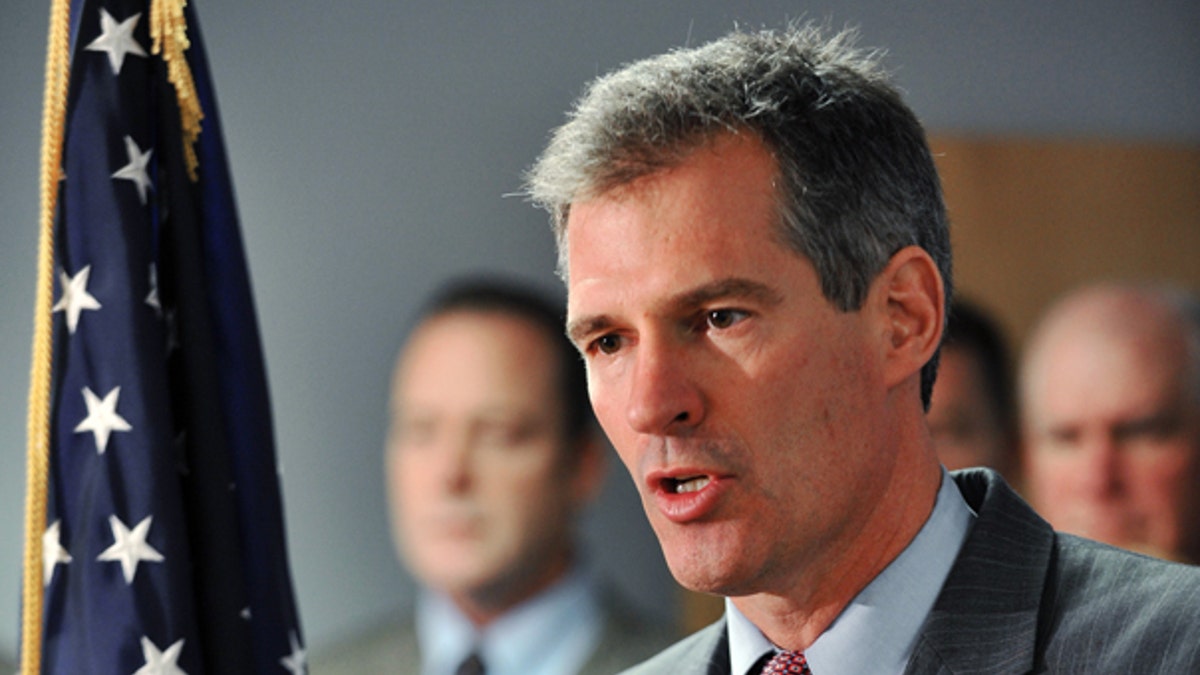
Jan. 11: Scott Brown speaks during a news conference in Marlborough, Mass., before winning the special election to the U.S. Senate seat. (AP Photo)
Massachusetts Republicans say they fear that if their candidate for U.S. Senate scores an upset victory in the special election next week, Democrats in the state and in Washington will drag out the certification process just long enough that he won't be able to block health care reform.
State Sen. Scott Brown, who is challenging Democratic Attorney General Martha Coakley for the seat once held by Ted Kennedy, is sounding the loudest alarm over that possibility.
Recent polling suggests Brown is closing in on front-runner Coakley. And if he does what once seemed impossible -- beat a Democrat for the bluest of blue Senate seats -- he is vowing to be the critical 41st vote against health care reform.
That means Brown could prevent Democrats from breaking a Republican filibuster against the overhaul and, in his words, "send it back to the drawing board."
Brown told Fox News on Tuesday that he's concerned Democrats will stall the certification process if he wins, so that the U.S. Senate can approve the health care reform bill before he gets there.
"When I heard ... the machine, not only locally but nationally, is trying to manipulate the process and make sure that if I'm elected, a duly elected senator, I can't be seated in an effort to vote on this important piece of national legislation, it made me almost sick to my stomach," Brown said.
The Boston Herald reported over the weekend that, according to a source, Secretary of the Commonwealth William Galvin's office plans to wait until Feb. 20 to certify the race.
"Everything I've heard right now I don't like very much," said Massachusetts Senate Minority Leader Richard Tisei, noting the secretary is signaling he will "drag his feet" if Brown wins.
But while a number of opportunities to delay the certification and swearing-in process are available, a spokesman for Galvin said Feb. 20 sounds too far off.
"They don't wait around," spokesman Brian McNiff said.
McNiff said local election districts have to wait at least 10 days before they submit their returns so as to allow time for military and overseas ballots to come in. They have a maximum of 15 days to submit them to the secretary's office, before the returns move to the governor's office.
McNiff said the governor's office has to wait a minimum of 15 days after the election to certify the results, but he said the governor's office typically certifies returns as soon as it legally can. That would mean the winner could head to Washington early next month.
But McNiff said the law does not give a set timeframe for when final certification has to occur. Republicans say Democratic state leaders may try to exploit any leeway they have.
And even after the results are certified, the Senate has to swear in the winner -- and until that person is sworn in, interim Sen. Paul Kirk, who has vowed to vote for health care reform even if Brown wins, remains senator.
An aide to Senate Majority Leader Harry Reid suggested the Senate would swear in the winner promptly.
"When there is a certified winner in Massachusetts, the Senate has received appropriate papers, and the vice president is available, the successor to Kennedy/Kirk will be sworn in," the aide said in an e-mail.
Recent polls offer differing takes on whether Brown actually has a shot at taking the seat.
According to Public Policy Polling group, the race is looking like a toss-up, with Brown up 48-47 percent over Coakley.
The poll of 744 likely Massachusetts voters taken Jan. 7-9 is very different from a poll by the Boston Globe taken Jan. 2-6 that showed Coakley up 15 points among 544 likely voters.
























